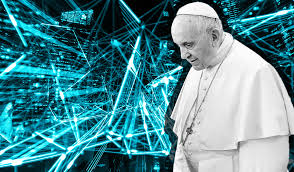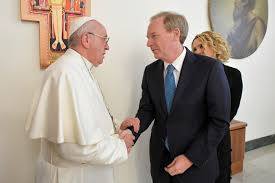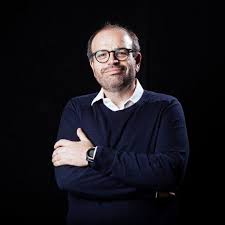In the ever-evolving world of artificial intelligence, the last person you might expect to find at the forefront of ethical AI governance is an octogenarian who admits he can’t use a computer. Yet, Pope Francis, with his endearing humility and profound wisdom, has emerged as a guiding light for the tech giants wrestling with the moral implications of AI.
Pope Francis is the first ever Pope to address the leaders of the G7 nations.
Italian Premier Giorgia Meloni invited Francis and announced his participation, knowing the potential impact of his star power and moral authority to twin a broadly shared concern about AI with his priorities about peace and social justice.
“The pope is, well, a very special kind of a celebrity,” said John Kirton, a political scientist at the University of Toronto who directs the G7 Research Group think tank.
An Unlikely Meeting
It all began one February afternoon in 2019, when Brad Smith, Microsoft’s President, found himself in the papal residence, seeking the Pope’s guidance on the burgeoning world of AI. In a scene that could have come straight out of a Dan Brown novel, the Pope, who you’d expect to be more comfortable with a quill than a quantum computer, delivered a poignant message: “Keep your humanity,” he urged, holding Smith’s wrist as if transferring some ancient wisdom directly into the veins of Silicon Valley.
From Deepfakes to Deep Thought
Fast forward five years, and AI has become as omnipresent as the Wi-Fi signal in your local hang-out cafe. The Pope himself had a brush with the technology last year when deepfake images of him in a rather stylish Balenciaga puffer jacket went viral. While he might not have known how to download an app, he certainly recognized the technology’s potential to both mesmerize and menace.
A Historic Address
In a historic move, Pope Francis recently addressed the Group of Seven (G7) leaders, laying out his vision for the “cognitive-industrial revolution” represented by AI. In a sweeping speech that was part sermon, part sci-fi thriller, he described AI as “as fascinating as it is terrifying,” warning that it could redefine our very conception of human identity. He was quick to highlight AI’s potential to democratize knowledge and advance science but cautioned against its darker applications, such as lethal autonomous weapons. “No machine should ever choose to take the life of a human being,” he declared, channeling his inner Isaac Asimov.
The Vatican’s Role in AI Ethics
The Vatican’s proactive stance on AI has earned it an unexpected role as the moral compass for tech giants like Microsoft. The “Rome Call for AI Ethics,” a document co-signed by the Vatican, Microsoft, and IBM in 2020, has become a cornerstone of global AI best practices. It even influenced the G7’s recent announcement of a new ethical label for companies developing AI tools responsibly.
From Galileo to Algorethics
It’s almost poetic that an institution often criticized for its slow adaptation to scientific progress (remember the Galileo affair?) is now a key player in the AI ethics debate. The Vatican has been dispatching representatives to major tech events, with the Rev. Paolo Benanti, a Franciscan priest and trained engineer, leading the charge. He’s credited with coining the term “algorethics” and has been instrumental in shaping Italy’s national AI policy.
Influencing Big Tech
Microsoft’s Brad Smith confessed that the Rome principles have significantly influenced the company’s approach to AI. For instance, Microsoft chose not to release a technology capable of replicating anyone’s voice after just a few seconds of recording, a decision grounded in the ethical guidelines inspired by the Vatican.
Selective Membership
But not everyone is queuing up to join the Pope’s AI club. Chinese tech giant Huawei, for instance, was given a polite but firm “no” when they asked to join the Rome initiative, with Archbishop Vincenzo Paglia, president of the Pontifical Academy for Life, expressing uncertainty about their ethical stance.
Vigilance and Warnings
The Vatican remains vigilant about the potential misuse of AI, particularly in areas like facial recognition and refugee processing, which could exacerbate inequalities and infringe on human rights. As Rev. Benanti put it, “We cannot spread AI everywhere without any political decision-making, because tomorrow we could wake up with a multiplier of inequality, of bioweapons.”
Humanity at the Helm
So, while Pope Francis might still struggle with sending an email, his impact on the world of AI ethics is anything but outdated. In a world hurtling towards an AI-driven future, it’s oddly comforting to know that an 87-year-old pontiff, armed with nothing but his moral compass and a disarming smile, is helping steer the ship. The message from the Vatican is clear: As we navigate the uncharted waters of AI, we must keep our humanity at the helm.
THE OPINIONS EXPRESSED IN THIS PIECE ARE SOLELY THOSE OF THE AUTHOR. FRANK KRISHNER IS A MEDIA CONSULTANT, TRAINER, AND A COMMUNICATION SPECIALIST.





Feel proud of the stand-off our Pontiff…keep humanity alive….this is the need of the hour